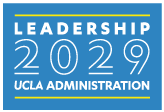Management Topic: Identifying Future Leaders
Dear Colleagues,
According to the Bureau of Labor Statistics, the median age of the working American will be 42.6 years by the year 2031. In 2001, that age was 39.6. Under the presumption that leaders tend to be among the more experienced members of an organization, the opportunities for developing potential leaders early in their tenure will be advantageous for the university, especially with diverse generations making up the talent pool.
In this month’s article, we will explore ways to identify future leaders, ways to think a little outside the box, and offer resources for helping your employees develop leadership skills.
Identifying Future Leaders in Today’s Workplace
I started my career as a field engineer with a large general contractor. On my first day, just a few days out of college, my superintendent sat me down and gave me two pieces of advice. One, fill your plate as full as you can by taking every opportunity to try out and learn new experiences. Two, never be afraid to make mistakes. Those two pieces of advice have served me well over the years, and are qualities I look for in future leaders. I have also added a third characteristic that I look out for, extreme ownership. This term was coined by retired Navy SEAL Jocko Willink, and refers to accepting ultimate responsibility for the events that shape your life without blaming external sources and taking control of things that are seemingly out of your control.
Fill Your Plate: I find that employees who are not afraid to push themselves beyond their comfort zone, even if only slightly beyond their limits, learn core competencies at a pace much faster than those who approach their job with apprehension. I also find that stretching beyond one’s boundaries leads to a better understanding of the big picture, which is an important leadership characteristic.
The Value of Making Mistakes: This is one of my favorite topics and will be covered in more detail in a future MMT article. Mistakes are part of being human. Learning from them is an opportunity to strengthen our capabilities and ask questions that ultimately lead to figuring out how to perform at our best. It also teaches coping skills in dealing with the inevitability that sometimes we fail. Create an environment where employees are allowed to make the occasional mistake without the fear of dire consequences. There are certainly limits to the kinds of mistakes that can be made, but the key here is NOT creating an environment where employees are so fearful of the consequences of failure that they refuse to grow.
Extreme Ownership: Sometimes circumstances which seem beyond our control can have a great impact on the path we travel. However, success is rarely born out of blaming others for the way things have turned out. By contrast, taking responsibility for every aspect of your life allows you to accept mistakes and formulate a plan for success. This leadership quality may sometimes be difficult to spot in an employee who does not hold a leadership position, but watch how they react when something goes wrong. Is the employee quick to blame others, or do they immediately begin to break the failure down to see how they are going to react the next time the situation arises?
Final Thoughts
There are plenty of other characteristics we could cover on this topic. Characteristics such as work ethic, education, technical skills, and other elements should be considered. Our purpose for writing this article is to look beyond the traditional method of identifying leaders that fit a narrow set of traits and perhaps encourage you to consider someone you may have overlooked. In the 27 years that I have been in the workforce, I have witnessed a dramatic shift from having a large pool of talent where leaders naturally emerge, to a much smaller pool of talent that is every bit as capable, but does not approach work in the same manner. New generations seem less interested in clinging to the traditions that my generation values, so it makes sense that we need to rethink the way we identify leaders.
We hope you found this article as meaningful as we did in writing it.
Resources
- Supervisory Principles Workshop (LMS course designed for team members interested in becoming supervisors)
- Level One Supervisory Certificate (LMS course designed for team members who recently became supervisors)
- Technology and Software Library (Section within LMS devoted to software training at all skill levels)
- UCLA Development Programs (MMT article)
- 19 Ways to Identify Potential Leaders in the Workplace (Indeed article)
- Simon Sinek: Why Good Leaders Make You Feel Safe (TED Talk about creating an environment of trust and safety among your team)

Interested in reviewing prior months’ topics? Visit our Monthly Management Tips website.
Do you have feedback, questions or a suggested topic you would like to learn more about? Please email: managementtips@ucla.edu.
Want to receive Monthly Management Tips emails? Sign up for our list!

